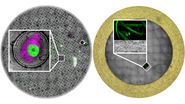Workflows and Instrumentation for Cryo-electron Microscopy
An overview - Webinar on-demand

Cryo-electron microscopy is an increasingly popular modality to study the structures of macromolecular complexes and has enabled numerous new insights in cell biology. In recent years, cryo-electron microscopy has expanded further towards in situ structural biology and has become the go-to technique for resolving structures in their native context. Similarly, freeze-fracturing and cryo-scanning electron microscopy (SEM) have grown in popularity.
Receive a full overview of cryo-preparation instruments, including vitrification, light microscopy screening, sectioning, planing, fracturing, milling, coating and transfer in our on-demand Webinar. All of these steps happen under cryogenic conditions while minimizing contamination and without risk of devitrification. We discuss several cryo-workflows to explain the full potential of the individual instruments.
Key Learnings
- Optimal vitrification of biological samples.
- Cryo-electron microscopy of vitreous sections (CEMOVIS) of large samples.
- Screening vitrified specimens using cryo-fluorescence microscopy.
- Freeze fracturing and cryo-coating.
- Cryo transfer for high vacuum instruments.
Webinar Link
Watch the Webinar on BiteSizeBio:



